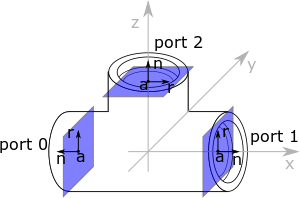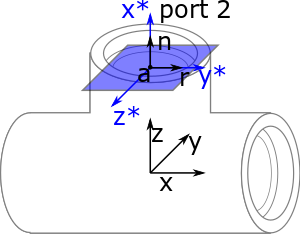OSE Piping Workbench Ports: Unterschied zwischen den Versionen
Zur Navigation springen
Zur Suche springen
Ruslan (Diskussion | Beiträge) |
Ruslan (Diskussion | Beiträge) |
||
| Zeile 1: | Zeile 1: | ||
The OSE Piping Workbench creates fittings. It uses '''ports''' to describe the ends of the fittings. The Ports helps to fit the fittings together correctly. | The OSE Piping Workbench creates fittings. It uses '''ports''' to describe the ends of the fittings. The Ports helps to fit the fittings together correctly. | ||
[[Datei:Ports.svg|mini|Ports of a tee in OSE Piping workbench.]] | [[Datei:Ports.svg|mini|Ports of a tee in OSE Piping workbench.]] | ||
| + | |||
| + | Every port is described by: | ||
| + | * Its position <math>a \in \mathbb{R}^3</math> | ||
| + | * A normal vector <math>n \in \mathbb{R}^3</math> which points out of the fitting and it is perpendicular to the port plane. | ||
| + | * A 0 reference angle vector <math>r \in \mathbb{R}^3</math> it shows where is the degree 0°. <math>r</math> must lie in the port plane. | ||
| + | |||
| + | Instead of using three separate vectors, we represent the port by its position and its orientation <math>A</math>. | ||
| + | The position is a FreeCAD Vector <math>a \in \mathbb{R}^3</math>. The orientation is a FreeCAD rotation matrix. When we apply matrix <math>A</math> on vectors <math>x = (1,0,0)</math>, <math>y = (0,1,0)</math>, <math>y = (1,0,0)</math>, it creates vectors <math>x^*</math>, <math>y^*</math>, <math>y^*</math> such that | ||
| + | * <math>x^*</math> points in the same direction as the port's normal, <math>x^* = n</math>. | ||
| + | * <math>y^*</math> shows in the same direction as the angular reference, <math>y^* = r</math>. | ||
| + | |||
| + | For example in a tee fitting, the matrix <math>A</math> is a rotation along y-axis by <math>\phi = 90^{\circ}</math>, and then a rotation along z axis by <math>\psi = -90^{\circ}</math>. See [https://www.freecadweb.org/wiki/Placement FreeCAD Rotation] for more details. Pictures (see [[#Port-orientation.svg]]) | ||
| + | |||
| + | [[Datei:Port-orientation.svg|mini|Orientation of port 2 in a tee fitting.]] | ||
Version vom 26. November 2018, 20:18 Uhr
The OSE Piping Workbench creates fittings. It uses ports to describe the ends of the fittings. The Ports helps to fit the fittings together correctly.
Every port is described by:
- Its position
- A normal vector which points out of the fitting and it is perpendicular to the port plane.
- A 0 reference angle vector it shows where is the degree 0°. must lie in the port plane.
Instead of using three separate vectors, we represent the port by its position and its orientation . The position is a FreeCAD Vector . The orientation is a FreeCAD rotation matrix. When we apply matrix on vectors , , , it creates vectors , , such that
- points in the same direction as the port's normal, .
- shows in the same direction as the angular reference, .
For example in a tee fitting, the matrix is a rotation along y-axis by , and then a rotation along z axis by . See FreeCAD Rotation for more details. Pictures (see #Port-orientation.svg)















